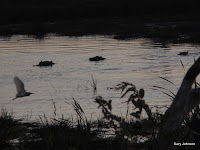We can hear and we understand the spoken language. Early after our return, we had lunch at a Mexican restaurant and the waitress greeted us with, “Hola!” We were both speechless for a moment searching for the proper response, trying to avoid either ‘hello’ or ‘sawubona’. We have found that we do miss the friendly, smiling greeting of the Swazi. When we start a conversation with servers, with ‘hello’ and ‘how are you’, expecting a response elicits odd looks from them.
Things are simply ‘not quite right’. The seasons are reversed again and the sun has found its rightful course skirting the southern sky.
After first setting foot in America, I was impressed with the use of mirrors. Frequently, I can see my whole body reflected, rather than just my chin.
Shopping is over the top. Leaving a hard-found, little display of greeting cards in SD, we found a 75-foot aisle, brightly lighted, with cards on both sides in our local Safeway; the produce section is a gigantic work of art; and the selections are mind boggling. No Swazi could comprehend two adjacent shops, one specializing in black and white, the other in ‘just pink’. Getting all the ‘plastic’ back has been an experience; the Costco card, the Safeway card, the QFC card, the…… and then trying to remember how to use them is a challenge.
At home, we marvel at the washer/dryer, the dishwasher, and the microwave, each of them saving us hours. We now take for granted, hot, running water.
We’re still adjusting to the traffic, and we’ve noticed all those ‘senior citizens’ out and about. And one last thing; sorry, but the American is certainly a sloppy dresser
Highlights of our first year in Siteki
• Successful “nesting,” turning our apartment into home
• Becoming friends with the Swazi’s that we work with on a frequent basis
• Being accepted in our work place
• The library and map project at the school
• Providing a safe haven for other PCVs who need some “posh corps” time.
• Christmas giving/party at the Neighborhood Care Points
• Acceptance and love from the kids at the school, many of them becoming well known personalities to us
• Vacations in Cape Town and St. Lucia
• Ability to volunteer without being proficient in SiSwati
• Learning sign language
• SKYPING with loved ones at home, seeing Evelyn within 14 hours of her birth.
• Opportunity to learn a new culture and see our own culture from a different perspective
• Sharing our adventure with one another… and with our blog readers.
“ Don’t cry because it’s over; smile because it happened.” Dr. Seuss



(Double click to enlarge.)










































 time consuming (not to mention elementary and boring). I’ve had the help of my
time consuming (not to mention elementary and boring). I’ve had the help of my The other significant project is the world map. The basics went surprisingly fast and we’re working on labeling and customizing now. When completed, I’m planning to have a companion map of Swaziland on the same wall. I’m pleased with the results, so far, and hope I can keep things moving along without entering ‘African time’. The first photo is tracing the projected image (we had to wait until after dark). In the second photo, the colorists (or colourists, here) on this day in the picture are an art class with the art teacher, Phumzile (left), and Fanelo (who teaches English comp) (all deaf).
The other significant project is the world map. The basics went surprisingly fast and we’re working on labeling and customizing now. When completed, I’m planning to have a companion map of Swaziland on the same wall. I’m pleased with the results, so far, and hope I can keep things moving along without entering ‘African time’. The first photo is tracing the projected image (we had to wait until after dark). In the second photo, the colorists (or colourists, here) on this day in the picture are an art class with the art teacher, Phumzile (left), and Fanelo (who teaches English comp) (all deaf).












